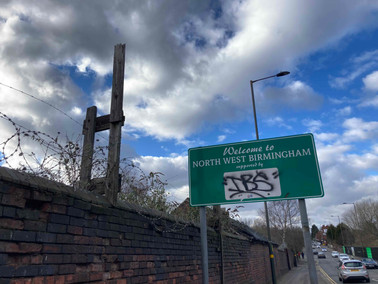Loving in Silence and Stillness
- Isaac Cui

- Mar 26, 2022
- 11 min read
A few weeks ago, I went to a Quaker meeting. It was a fascinating anthropological experience — if you’re unfamiliar, Quakers worship by sitting in a circle in silence, to be broken only when someone feels called to speak to the group. But I want to write more reflectively, today, about a topic the meeting inspired me to think of: love — and, more specifically, loving in silence and stillness.
Let me first motivate the question. When I got to the Quaker Meeting House at Bunhill Fields, adjacent to the cemetery where George Fox was buried, I was handed a nice pamphlet — Your first time at a Quaker meeting — that explained the philosophical-religious understanding of the meeting:
In the quietness of a Quaker meeting worshippers can become aware of a deep and powerful spirit of love and truth, transcending their ordinary experience. We seek to become united in love and strengthened in truth, so we enter a new way of living, despite the different ways we may account for this life-expanding experience.
A handbook —Advices & queries — describes, at paragraph 8, how “gathered stillness” at a Quaker meeting allows congregants to “feel the power of God’s love drawing us together and leading us.” This gathered stillness, to return to the first pamphlet, is meant to create space for people to “listen to the promptings of truth and love in our hearts.” These meetings, therefore, are “based on silence: a silence of waiting and listening.”
For the Quakers, then, gathered silence and stillness is a means to cultivate, feel, and channel love. Thus the question I want to explore in this post: In what sense do, or can, we love others by being with them in silence and stillness?
I wrote that my New Year’s resolution this year was to think more about love, and so let me try to place some parameters on how, specifically, I intend to do so. First, though my inspiration here is religious, I intend — in analogy to Shklar — to think not about a theological notion of love but about an emotion, an action, or a relation felt by and among people for things in the world. For the Quakers, and I suspect for many people of other faiths, being with others is a way to feel God’s love or to worship God. There is, I think, a kind of triangular relationship at play, where the self, others, and God are in some complex, mutual, and transcendental bind. I intend, however, to think solely at the corporeal level.
Second, I want to think about love as manifested in different experiences and spaces. I will not try to categorize (or even assume the existence of) different “kinds” of love. Rather, as Pitkin did with the concept of “representation,” I am going to assume there is some relevance to the fact that we express many emotions, activities, and states of being in terms of “love” and to try to think through the significance of those descriptors. Put more concretely, I assume there is some significance to the fact that we may meaningfully say that we “are in love” (either with or without some object), that we “have love,” “make love,” and “are loved”; that the objects of one’s “love” may range from friends to family to romantic partners, from deities to trivial pursuits to nations. And I will try, like Montaigne, to use my own experience as a kind of prism for thinking about this concept.
The question for this post — on loving in silence and stillness — is interesting because I think it draws my attention to complications in my own intuition. I associate love with an active, passionate, dialogic experience. It’s standard dating advice, for example, to pick an interactive activity — cooking or crafts — rather than a passive one (watching a movie); it’s said that a date goes poorly if the conversation is dull or filled with awkward silences. Surely silence and stillness are exactly what one doesn’t want.
But there is, of course, intuition in the opposite direction. For many people, it is a mark of comfort and ease, and perhaps even love, to be able to be with each other in silence and stillness. One friend told me about her parents, who love to sit together in silence. Montaigne thought the greatest friendships were effectively unions of people, where the friends’ souls “mix and work themselves into one piece”: “If a man should importune me to give a reason why I loved him [Montaigne’s best friend, Étienne de la Boétie], I find it could no otherwise be expressed, than by making answer: because it was he, because it was I.” In my own experience, it is in moments of silence and stillness when I have felt closest to others: for example, during the bittersweet weeks after graduating high school, right before I was to leave Texas for a long time, when I was simply sitting in a car with a friend as the song “Rivers and Roads” played. It is in such moments, I think, when there is a simultaneity of thought and action that induces a feeling of communion, togetherness, even of oneness, as Montaigne felt.
Indeed, even at the Quaker meeting, I think I felt an inkling of what the pamphlet meant. There was a kind of transcendental experience in knowing that we were all experiencing together: hearing the same kids playing outside on the playground, the same drip of a leaky faucet; feeling the same breeze from an ajar door, just cold enough to make you feel slightly numb on your skin but not cold enough to make you shiver; periodically shuffling our feet and stretching our backs in the same motions as we settled into a shared experience of worship. I felt a kind of hyper-awareness that made me less aware of the people around me. I had never met, never seen, never spoken to the people around me; I didn’t know their names. And yet I did feel, at least to a degree, close and one with them.
But we weren’t actually one. We might have felt, as Montaigne would put it, “some little intercourse betwixt our souls,” but there was no true familiarity and knowledge of the others. In the hour we sat together, only one person stood up to speak, and her speech was miles from what I was thinking about. It reminded me of the rather obvious fact that no matter how much we shared bodily experiences, our minds could be — and likely were — totally apart.
If there is love in these moments of silence and stillness, it is an undirected and corporeal one — a unique kind of love indeed. It is undirected because it is an abstract love for others in the space, regardless of who they are (and, in fact, that love cannot depend on who they are, for we do not know anything about each other). This is a love that stems from the bodily experience of being together, of breathing the same air, feeling the same sun, resting in the same space. After all, I reflected after leaving the worship, the only difference between this Quaker meeting and meditating on one’s own, I think, is the concreteness of our fellowship. The meditator knows, of course, that there are others meditating in the world. They may meditate as part of some social organization, religious or merely associational. They may, therefore, have an “imagined community,” which of course has psychological force and may even induce a feeling of love, as Anderson taught. But there is an experiential difference in the imagined versus the embodied community.
To be physically together is to offer a foundation for loving one another. It may even be conducive to a very special love — “you can hear it in the silence,” Taylor Swift sings — but I did not feel the same force, the same pull, the same conviction, perhaps, from the silence and stillness in the group setting — one that induces a kind of generalized love — as in other experiences of love.
* * * * *
Last time I wrote, I was supposed to go to Barcelona for a trip. For various reasons, that failed. But I was sufficiently sad about it failing that I ended up doing a trip during that period to Bergamo, a city in Northern Italy (around thirty miles from Milan), mostly because I was able to find last-minute plane tickets for around twenty pounds (!) (Feb. 21–23). It was the first time I’d been to Italy, as well as the first time I’d traveled alone. It was a pretty nice experience.
When I first got into the city center, the sun was already setting; I knew all I would have time for is to wander around and then get dinner. Bergamo is essentially two cities — the “città bassa,” which is a more modern and normal “lower city,” and the “città altà,” the hilltop, fortressed, and older “high city.” The bus dropped me at the città bassa, and so there I explored. Very quickly I found my way into my first (of many) Catholic churches. It sounds silly, but I didn’t quite realize just how much Catholicism there would be in Italy. It was mind boggling, and each church was gorgeous. Basically all I did that night, though, was walk around, get dinner (I had a recommendation from the guy sitting next to me on the plane, which meant the place was amazing, but it was also mostly locals, i.e., they didn’t really accommodate English-speaking tourists), and then walk to the hostel. Something I learned about Italian food: they typically serve an espresso shot after dinner. But not only that, I was also given around half a bottle of wine with my dinner. Both the alcohol and caffeine kept me up, and I think I ended up getting only around four hours of sleep that night, which was unfortunate because I only had one real day in Bergamo.
The next day was to explore the high city. The walls form part of a UNESCO World Heritage Site — the Venetians captured Bergamo in the 1600s and used it as a kind of military outpost, so they also built some magnificent walls in the high city. There was also a museum, a tower with some gorgeous views, and what I think was a seminar that I wandered into. (Bergamo was the home of Pope John XXIII, Papa Giovanni XXIII, so there’s plenty of his memorabilia.) I had lunch that day at another local restaurant, where toward the end of the meal, a nice couple began talking to me. Funnily enough, they started in Chinese, and then when I told them I was an American, we transferred to English. They left me their business card, and it turns out they were Jehovah’s Witnesses (the first Jehovah’s Witnesses I have ever met!). Then the rest of the day was spent wandering into the lower city again, where I found some gelato, went into a more low-key church, and explored the commercial district of Bergamo. All in all, it was a simple trip, but I appreciated having time to be by myself, explore freely, and think. Plus, I did appreciate the variety of churches (I believe I went to ten in total). And on the flight back, I had the opportunity to marvel at the Alps. It drove home the miracle that was Hannibal crossing the alps with elephants.
The week after, I went to the Phantom of the Opera (March 4), which was weird, and then a day trip to Birmingham (March 5). We ended up seeing quite a bit in Birmingham because we were trying to make the most of our time. We saw multiple Anglican churches, a Sikh temple, a graveyard, a Shakespeare library and a Black Sabbath memorial, an absolutely gorgeous library, a mosque, plenty of pride, and a Tim Hortons (!?!). It was wholesome. I don’t know that I need to go back to Birmingham, but it was an enjoyable day trip.
The next Monday (March 7), my friend had pulled me into a trip to see the ballet (Swan Lake). It was . . . kind of boring. But I was impressed by the athleticism of the dancers and by the music.
That week was the admitted students week at NYU Law (March 7–9), which was pretty cool — I got to sit in on a conlaw class with Melissa Murray (!!!), to talk with Trevor Morrison, and to ask Jeremy Waldron about Judith Shklar. It was fun. Also, I’ve gotten access to a piano again — I joined the LSE Music Society, and so it’s been nice to get to play a bit. Then, the week after, the weather started getting nice, and I went to see the Kenwood House (the former home of the Lord Chief Justice Mansfield) with my LSE friend from last year (March 20). Also, I hanged out with a friend who goes to UCL, and she showed me Jeremy Bentham’s body!!!

Most recently, I went to Lisbon with one of my old flatmates (March 20–23). It was a bit of funny timing: Portugal generally is the place that British people go on holiday to in order to escape the gloom in favor of the sun. But when we were there, London was warmer than Lisbon, and there were blue skies in London whereas Lisbon was extremely rainy. Alas, we still had a good time.
We arrived in Lisbon midday Sunday, and we were exploring the older part of town, the Alfama district. We found our way to the Lisbon Cathedral (Sé de Lisboa), went to a museum dedicated to Portugal’s experience with dictatorship (the Museu do Aljube Resistência e Liberdade), got our first pastéis de nata (no other pastries/desserts, except perhaps the croissant flavored with port wine, was even close to worth it compared to simply trying different places’ pastéis de nata), walked to a cemetery (it was closed, but at least we got to see different parts of Lisbon), and then had dinner.
The next morning, we went to the castle — the Castelo de São Jorge — which was originally built by the Moors, although the hilltop was occupied much further back historically. There were some gorgeous views of the city, plus peacocks! We also stopped for some more pastéis de nata (we ended up trying them at six different places), went to the church near the castle, and then went to the ruins of a convent, which were turned into a museum. It was stunning architecturally, but it was a bizarre museum. I couldn’t figure out the logic for why there were certain things there: for example, there were lots of gorgeous azure tiles (trademark of Lisbon), but also Peruvian mummies! After that, the sun started coming out, and we walked to the major park in Lisbon (Parque Eduardo VII), where my friend wanted to sunbathe and rest while I kept exploring (I ended up seeing a mosque, walking through a local university campus, visiting a church, and seeing some aqueducts).
On Tuesday, we went to Belém, which is famous both as the place where explorers from Portugal set off (thus, there’s much nationalism — and, in my view, post-imperial melancholy — associated with the place) as well as where the President of Portugal lives. We got more pastéis de nata, went to the maritime museum (meh, not sure it was worth it), got lunch, then split ways: my friend wanted to go climbing, whereas I wanted to continue seeing the sights. I ended up wandering my way into a museum about a local school, a hill-top chapel (the Capela de São Jerónimo), the church of some Catholic sect (I didn’t even know that was a thing! It was the Santuário de Schoenstatt, part of the Apostolic Movement of Schoenstatt), visiting the Jerónimos Monastery (a UNESCO world heritage site!) and its accompanying church, and then running into a cool manifestation of international law: a park mural noting the Charter of Fundamental Rights of the European Union. Outside of the Monastery, there was also a sign about the Treaty of Lisbon (2007), a major constitutional change in the European Union, which strengthened the power of the European Parliament (the body directly elected by European citizens) and functioned to create a more powerful EU by enabling the process of delegated and administrative rulemaking. It was great.
We flew out midday Wednesday, so we mostly just had a slow morning and had a nice brunch. I couldn’t resist buying some extra pastéis de nata for the trip home because they were so good.
Rose: Traveling has been really nice — it’s cool to see other parts of the world. ALSO, the day before I went to Bergamo, I became an uncle! Welcome to baby Alaska, born February 20, 2022. (She is very cute.)
Bud: I’m going home soon! Next weekend, I have a quick trip to Rome (April 2–4), then I’m flying to the Bay Area to visit Stanford. I’ll be home, after, from April 11–14, then I’m visiting Yale (April 14–15), and then coming back to London on April 16. It’ll be a tiring but exciting few weeks.
Thorn: I still feel knackered by that first night in Bergamo. Don’t make the mistake of drinking espresso after dinner unless you’re really good with caffeine! Also, it’s hitting me that my time in the UK is almost done, and it’s making me nostalgic. I will miss this city.
Gratitude: The skies have been clear, the sun is setting later and later, and I’ve had the chance to spent lots of time with loved ones. What else could one ask for?












































































































































































































































Comments